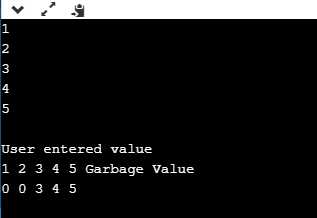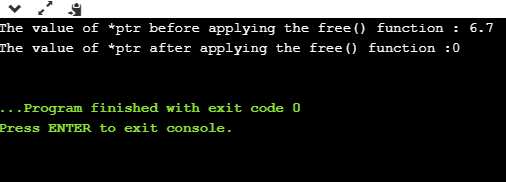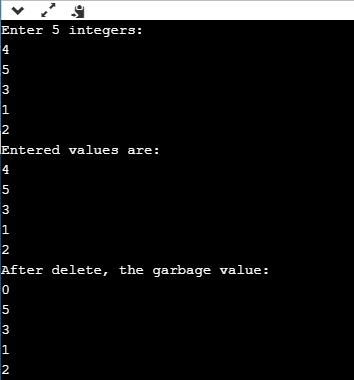C++ free()与delete
在本主题中,我们将学习 free()函数和delete C++中的操作符。
free()函数
free()函数在C++中用于动态取消分配内存。它基本上是C++中使用的库函数,并且在 stdlib.h 头文件中定义。当指针指向使用malloc()函数分配的内存或Null指针时,将使用该库函数。
free()函数的语法
假设我们已经声明了一个指针" ptr",现在,我们要取消分配其内存:
以上语法将取消分配指针变量'ptr'的内存。
free()参数
在上述语法中,ptr是free()函数内部的参数。 ptr是指向使用malloc(),calloc()或realloc函数分配的内存块的指针。此指针也可以为null或使用malloc分配但不指向任何其他内存块的指针。
如果指针为null,则free()函数将不执行任何操作。
如果使用malloc,calloc或realloc分配了指针,但未指向任何内存块,则此函数将导致未定义的行为。
free()返回值
free()函数不返回任何值。它的主要功能是释放内存。
让我们通过一个示例来理解。
#include <iostream>
#include <cstdlib>
using namespace std;
int main()
{
int *ptr;
ptr = (int*) malloc(5*sizeof(int));
cout << "Enter 5 integer" << endl;
for (int i=0; i<5; i++)
{
// *(ptr+i) can be replaced by ptr[i]
cin >>ptr[i];
}
cout << endl << "User entered value"<< endl;
for (int i=0; i<5; i++)
{
cout <<*(ptr+i) << " ";
}
free(ptr);
/* prints a garbage value after ptr is free */
cout << "Garbage Value" << endl;
for (int i=0; i<5; i++)
{
cout << *(ptr+i)<< " ";
}
return 0;
}
上面的代码显示free()函数如何与malloc()一起工作。首先,我们声明整数指针* ptr,然后使用malloc()函数将内存分配给该指针变量。现在,ptr指向5个整数的未初始化存储块。分配内存后,我们使用free()函数销毁分配的内存。当我们尝试打印ptr所指向的值时,会得到一个垃圾值,这意味着内存已取消分配。
输出

让我们看看free()函数如何与calloc一起工作
。
#include <iostream>
#include <cstdlib>
using namespace std;
int main()
{
float *ptr; // float pointer declaration
ptr=(float*)calloc(1,sizeof(float));
*ptr=6.7;
std::cout << "The value of *ptr before applying the free() function : " <<*ptr<< std::endl;
free(ptr);
std::cout << "The value of *ptr after applying the free() function :" <<*ptr<< std::endl;
return 0;
}
在上面的示例中,我们可以观察到free()函数与calloc()一起工作。我们使用calloc()函数将内存块分配给浮点指针ptr。我们为ptr分配了一个内存块,该内存块可以具有单个浮点类型值。
输出:

让我们看看另一个示例。
#include <iostream>
#include <cstdlib>
using namespace std;
int main()
{
int *ptr1=NULL;
int *ptr2;
int x=9;
ptr2=&x;
if(ptr1)
{
std::cout << "Pointer is not null" << std::endl;
}
else
{
cout<<"Ponter is null";
}
free(ptr1);
//free(ptr2); // if this statement is executed, then it gives a runtime error.
return 0;
}
上面的代码显示free()函数如何与NULL指针一起工作。我们声明了两个指针,即ptr1和ptr2、我们为指针ptr1分配NULL值,为指针ptr2分配x变量的地址。当将free(ptr1)函数应用于ptr1时,分配给ptr的内存块将成功释放。 free(ptr2)语句显示运行时错误,因为未使用malloc或calloc函数分配分配给ptr2的内存块。
输出

delete运算符
它是一个 C++编程语言中使用的运算符,它用于动态取消分配内存。此运算符主要用于使用新运算符分配的指针或NULL指针。
语法
例如,如果我们使用new运算符将内存分配给指针,现在我们要delete它。要delete指针,我们使用以下语句:
要delete数组,我们使用以下语句:
与delete运算符有关的一些重要要点是:
它用于delete使用new关键字分配的数组或非数组对象。
要delete数组或非数组对象,我们分别使用delete []和delete运算符。
new关键字在堆中分配了内存;因此,我们可以说delete运算符总是从堆中取消分配内存
它不会破坏指针,但是指针所指向的值或内存块会被破坏。
让我们看一下delete运算符的简单示例。
#include <iostream>
#include <cstdlib>
using namespace std;
int main()
{
int *ptr;
ptr=new int;
*ptr=68;
std::cout << "The value of p is : " <<*ptr<< std::endl;
delete ptr;
std::cout <<"The value after delete is : " <<*ptr<< std::endl;
return 0;
}
在上面的代码中,我们使用new运算符分配内存,因此我们使用delete ptr运算符销毁了指针ptr所指向的内存块。
输出

了解delete如何与一系列对象配合使用。
#include <iostream>
using namespace std;
int main()
{
int *ptr=new int[5]; // memory allocation using new operator.
std::cout << "Enter 5 integers:" << std::endl;
for(int i=1;i<=5;i++)
{
cin>>ptr[i];
}
std::cout << "Entered values are:" << std::endl;
for(int i=1;i<=5;i++)
{
cout<<*(ptr+i)<<endl;
}
delete[] ptr; // deleting the memory block pointed by the ptr.
std::cout << "After delete, the garbage value:" << std::endl;
for(int i=1;i<=5;i++)
{
cout<<*(ptr+i)<<endl;
}
return 0;
}
输出

delete和free()之间的区别
以下是C++中delete和free()之间的区别:
delete是一个运算符,它动态地取消分配内存,而free()是一个在运行时破坏内存的函数。
delete运算符用于delete使用new运算符分配的指针或NULL指针,而free()函数用于delete使用malloc(),calloc()或realloc()函数或NULL指针。
当delete运算符销毁分配的内存时,它会在C++中调用该类的析构函数,而free()函数不会调用该析构函数;它只会从堆中释放内存。
delete()运算符比free()函数更快。





